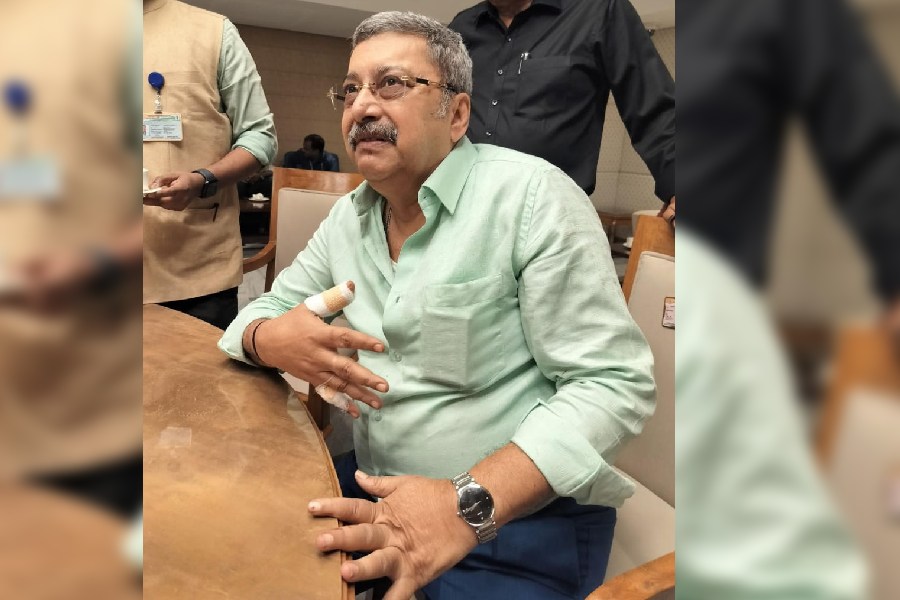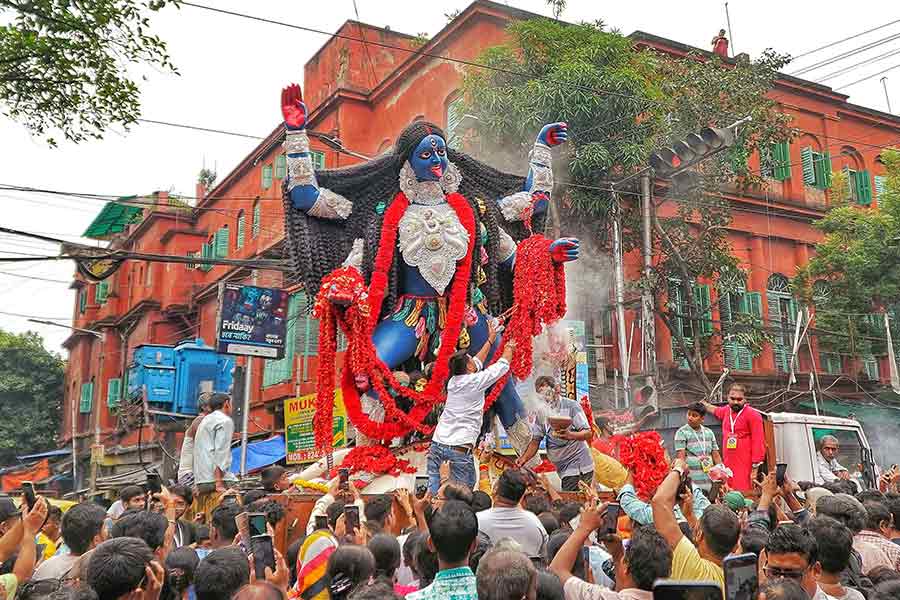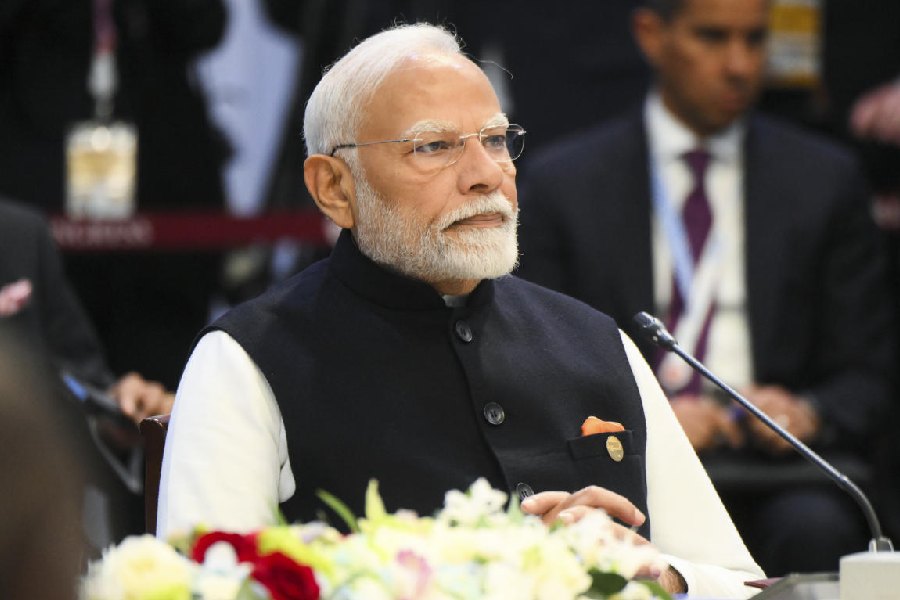 Wednesday, 23 October 2024
Wednesday, 23 October 2024
 Wednesday, 23 October 2024
Wednesday, 23 October 2024
In the 127 minutes that Bengal chief minister Mamata Banerjee spent on Monday meeting a section of protesting junior doctors, the main point of debate that emerged was about how far the government could – or should – exert control over the medical colleges.
Mamata’s unhappiness with the RG Kar Medical College and Hospital’s college council’s decision to suspend and expel 51 junior doctors accused of perpetrating a threat culture stands out as an example.
A vacation bench of Calcutta high court on Tuesday issued an interim stay on the RG Kar college council’s punitive action. The court reportedly pointed out that the principal took the decision merely on the recommendation of an inquiry committee.
“The principal should have obtained approval from the health department before taking any action against the accused,” Justice Kaushik Chanda reportedly said during the hearing.
At Monday’s meeting, Mamata had asked the RG Kar Medical College principal, Manas Bandyopadhyay, why he had not informed the government of the action. As the meeting proceeded, the chief minister, who also is in charge of the health portfolio, asked the state health secretary Narayan Swarup Nigam how the college councils were formed.
Nigam’s explanation did little to bring down Mamata’s temper. “Were we ever informed about this [setting up of college council]? Is it not the duty to keep the state informed?”
The answer may be found on the homepage of SSKM Hospital and Institute of Post Graduate Medical Education and Research.
Once known as the premier hospital of the state, IPGMER – inaugurated by the first Prime Minister Jawahar Lal Nehru on January 16, 1957 – started running undergraduate courses just 20 years ago.
“The College Council is the supreme authority in academic matters,” it says on the homepage. “It functions to advise the Director in academic, disciplinary and administrative issues of the institute, assist the Director in the liaison with the higher authorities and to coordinate the functioning of the various academic departments.”
It is this supreme authority – granted to the medical colleges across the country by the National Medical Commission – that the chief minister has now challenged and overruled, by her order that all complaints would henceforth be addressed by the state-level task force and not the respective medical colleges.
Monday’s meeting granted special powers to the apex task force headed by the chief secretary with the acting director general of police, a member of the state grievance cell and the Calcutta police chief along with representatives from the junior doctors and the students.
That stands contrary to the recommendations of the National Medical Commission.
“The college council includes the principals and the head of departments. Whether it is a state-run medical college or a private one, the college council is empowered by the National Medical Commission to take all decisions regarding the functioning of medical colleges,” said Dr Subir Ganguly, former head of Oncology at Calcutta Medical College and Hospital and former president of IMA Bengal.
He asked: “Why does the government want to control everything?”
The question of centralisation and control had chased the CPM for the 34 years that it was in power in the state. Under the stewardship of the late Jyoti Basu, then health minister Partha De’s decision to ban medical college teachers from private practice had led the finest men and women in white coats in the city’s top state-run medical colleges and hospitals to move to the far-greener private pasture.
The decision was revoked a decade later when Surjya Kanta Mishra took charge as the health minister. The damage was done by then.
Three of the major medical colleges in Calcutta, which trace their roots to the Raj days, had started as private institutes run by Indians like Radha Gobindo Kar who set up an institute with other physicians including the legendary Nil Ratan Sircar, who was running his own medical school.
Over the years, starting with IPGMER, then NRS Medical College and Hospital and RG Kar Medical College and Hospital were acquired by the government of the day. The youngest of these, the National Medical Institute set up in 1921, was made a part of the government machinery when the CPM came into power holding the hands of the Bangla Congress and other Leftist parties, a decade before the Left Front was formed.
“Teachers in the National Medical College were recruited by the college and they ended their careers there, like my teacher in surgery Bimalendu Chatterjee. They could not be transferred,” said Sanjay Banerjee, an alumnus of Calcutta National Medical College and editor of the Journal of Indian Medical Association.
Once the medical colleges came fully under the control of the government (the private medical colleges were still a few decades away), the teachers – also senior doctors – could be transferred depending on the whims and fancies of the party in power.
The most recent example again is Sandip Ghosh, the former principal of RG Kar Medical College and Hospital, now arrested on charges of graft and also for his alleged role in the rape and murder of the young medico.
Mamata has not yet explained why Ghosh was immediately transferred to the National Medical College and Hospital within hours of tendering his resignation from RG Kar. A decision that left even the chief justice of the Calcutta high court TS Sivagnanam wondering how influential Ghosh was.
In the nearly three months that a section of the junior doctors have been waging this unequal battle against the state, they have come under attack from MPs, MLAs and street-level leaders of the ruling party.
The barbs and attacks had all been about one thing: if the government is paying the salaries, how can the junior doctors and others protest? They have been branded as traitors and inhuman.
There is another prescription for the impasse: Reverting to the days of the Raj and the first decade of Independence and leaving the medical colleges alone, maybe under a private umbrella.
Biplab Chandra, a former student of RG Kar medical college and hospital who had participated in many movements during the Left rule and is now secretary of the SUCI (Communist)-backed Medical Service Centre, said it would be wrong to equate the two.
“These medical colleges were founded for a social cause keeping in mind the need of the community denied by the British rulers, and not for any personal gains,” Chandra said.
Dr Kunal Sarkar, senior vice chairman, director and head of cardiac surgery at Medica Superspecialty Hospital, told The Telegraph Online that involving the private sector might have made the medical colleges better administered, but he does not see it happening.
“Dilution of government holding, be it at the Centre or the state levels, I do not see it happening,” he said.
“In our system of democracy delivery of public healthcare is something that each party wants to encash as a populist measure. We simply do not have the resources to build a healthcare system like in the UK, Australia and the Scandinavian countries. The government has to be seen delivering healthcare and medical education,” said Sarkar.
“The private footprint is already much larger than the government. Further dilution will go against the political will, as they stand to lose their influence and clout.”
Even the staunchest critic of Mamata cannot accuse her of decentralising power, be it in running her party or her administration. It’s foolish to expect from her – or any party in power – the kind of decentralisation and autonomy the doctors want.







